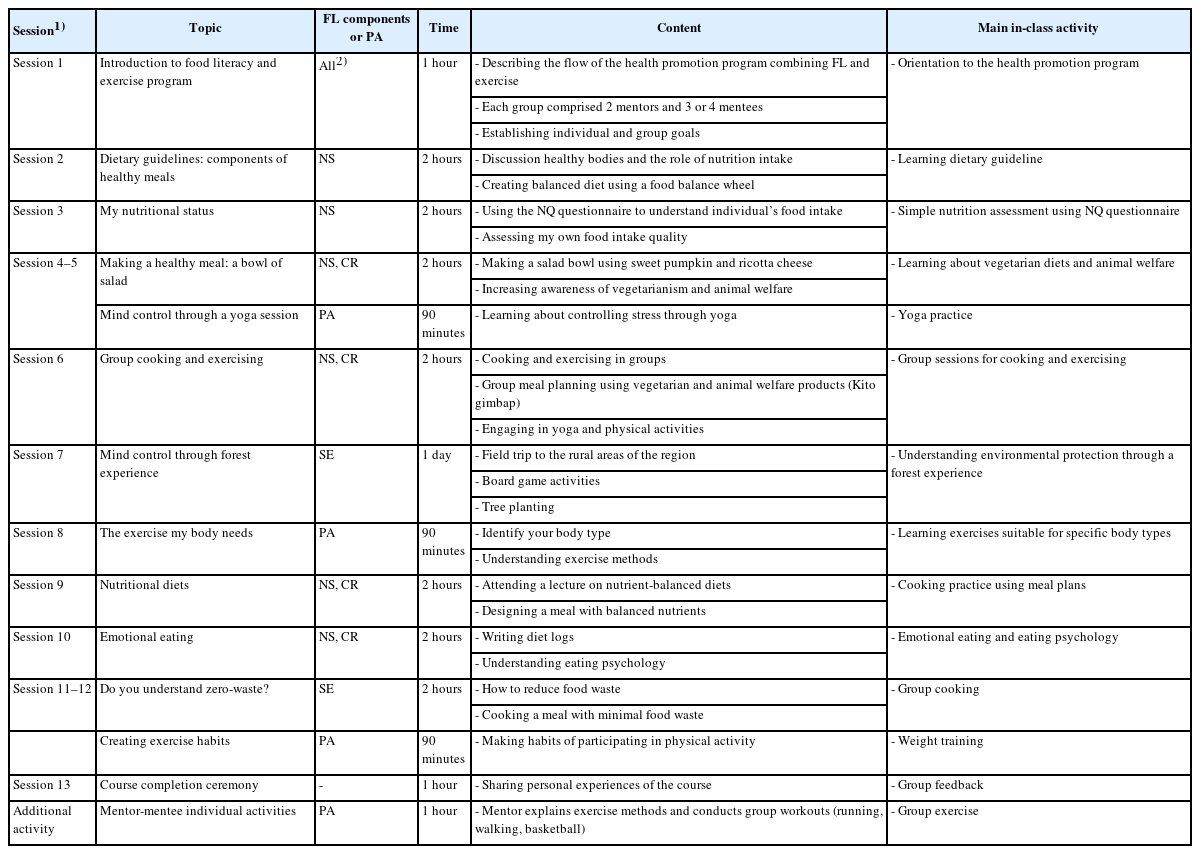Search
- Page Path
- HOME > Search
Research Note
- [English]
- A pilot investigation of a combined food literacy and exercise program for college students: a one-group pre-post intervention study
- Minjeong Jeong, Jinhyun Kim, Dahye Han, Eunjin Jang, Kyoungho Choi, Sohyun Park
- Korean J Community Nutr 2024;29(6):455-466. Published online December 31, 2024
- DOI: https://doi.org/10.5720/kjcn.2024.00248

-
 Abstract
Abstract
 PDF
PDF - Objectives
A campus-based intervention to enhance food literacy (FL) and establish exercise habits among college students was developed and the program’s effectiveness was evaluated.
Methods
The 13-session program was developed based on the transtheoretical model and social cognitive theory. Junior and senior students majoring in food and nutrition and physical education were asked to participate as mentors, with freshmen and sophomores from varied majors as mentees. The program encompassed food, nutrition, and exercise lessons including cooking sessions. Data were collected via pre- and post-program surveys using a questionnaire consisting of items on FL and nutrition behaviors and physical fitness measurements.
Results
Among 39 participants (35.9% male, 64.1% female), the overall FL score increased significantly from 64.1 to 70.6 post-program (P = 0.001). Significant increases were observed in the nutrition and safety (P < 0.001), cultural and relational (P = 0.023), and socio-ecological (P = 0.001) domains, as well as knowledge (P = 0.001), self-efficacy (P = 0.013), attitude (P < 0.001), and behavior (P = 0.005) items in three domains of FL. Additionally, meal duration increased significantly (P = 0.007) and sit-up performance among female showed a meaningful change (P = 0.046). Changes in dietary behaviors significantly progressed (P = 0.015) while that in exercise habits approached a marginal significance (P = 0.053) after the intervention.
Conclusion
The results reveal positive changes in FL and some modifications in eating habits, although the program had limited effects on physical activity and fitness measurements. These findings suggest that strategic approaches to foster exercise behavior changes in college students are required. This pilot program can serve as foundational data for improving and expanding multicomponent health promotion programs for this population. -
Citations
Citations to this article as recorded by- The Dragon Fruit Advantage: Exploring University Students’ Experiences and Perceptions of a Targeted Nutrition Education Module
Adelfa Silor, Faith Stephanny C. Silor
Seminars in Medical Writing and Education.2025; 4: 924. CrossRef
- The Dragon Fruit Advantage: Exploring University Students’ Experiences and Perceptions of a Targeted Nutrition Education Module
- 2,543 View
- 55 Download
- 1 Crossref

Educational Materials
- [English]
- Development of a campus-based intervention program to strengthen food literacy among university students: A qualitative formative study
- Eunji Ko, Eunjin Jang, Jiwon Sim, Minjeong Jeong, Sohyun Park
- Korean J Community Nutr 2023;28(6):495-508. Published online December 31, 2023
- DOI: https://doi.org/10.5720/kjcn.2023.28.6.495
-
 Abstract
Abstract
 PDF
PDF - Objectives
This study aimed to develop a campus-based intervention program to enhance food literacy (FL) among university students.
Methods
In the initial phase, we conducted a literature review of FL intervention studies and held in-depth interviews with university students to identify facilitators and barriers to improving and practicing FL. Expert counseling sessions were conducted with nutrition education, marketing, and service design professionals. The results of this phase led to the creation of an initial curriculum draft. In the second phase, a follow-up survey was conducted with young adults to assess the acceptability of the developed curriculum. After the follow-up survey, additional meetings were conducted with the aforementioned experts, and the curriculum was further refined based on their input.
Results
An 11-week FL intervention program was devised using constructs from the Social Cognitive Theory. The weekly curriculum consisted of 90-min theory-based and 90-min hands-on experience sessions. Three primary aspects of FL were covered: nutrition and food safety, cultural and relational dimensions, and socio-ecological aspects. Program highlights included cooking sessions for crafting traditional Korean desserts, lectures on animal welfare, insights into zero-waste practices, and communal eating experiences. Based on the study team’s previous research, the program also addressed mindful eating, helping participants understand the relationship with their eating habits, and providing strategies to manage negative emotions without resorting to food. Yoga sessions and local farm visits were incorporated into the curriculum to promote holistic well-being.
Conclusions
This study elucidated the comprehensive process of creating a campus-based curriculum to enhance FL among university students, a group particularly susceptible to problematic eating behaviors and low FL levels. The developed program can serve as a blueprint for adaptation to other campuses seeking to bolster students’ FL. -
Citations
Citations to this article as recorded by- Effects of nutrition class with cooking lab on college students’ eating behaviors and well-being in the United States: a mixed-methods study
Borham Yoon, Kyungyul Jun
Nutrition Research and Practice.2025; 19(2): 305. CrossRef - The Dragon Fruit Advantage: Exploring University Students’ Experiences and Perceptions of a Targeted Nutrition Education Module
Adelfa Silor, Faith Stephanny C. Silor
Seminars in Medical Writing and Education.2025; 4: 924. CrossRef - Evaluating the effectiveness of a food literacy pilot program for university students: using a mixed-methods research approach
Eunji Ko, Eunjin Jang, Jiwon Sim, Minjeong Jeong, Sohyun Park
Nutrition Research and Practice.2024; 18(6): 885. CrossRef - A pilot investigation of a combined food literacy and exercise program for college students: a one-group pre-post intervention study
Minjeong Jeong, Jinhyun Kim, Dahye Han, Eunjin Jang, Kyoungho Choi, Sohyun Park
Korean Journal of Community Nutrition.2024; 29(6): 455. CrossRef
- Effects of nutrition class with cooking lab on college students’ eating behaviors and well-being in the United States: a mixed-methods study
- 2,587 View
- 76 Download
- 4 Crossref


 KSCN
KSCN

 First
First Prev
Prev



